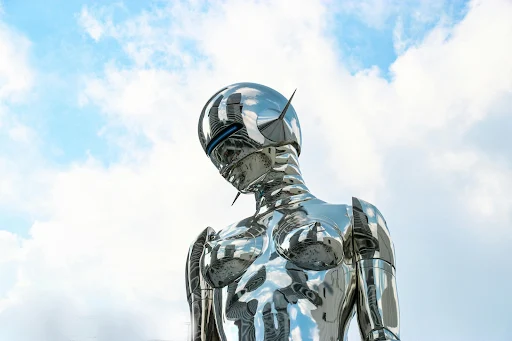Artificial Intelligence (AI) has emerged as one of the most revolutionary technologies of the 21st century, impacting almost every industry. From automating mundane tasks to enhancing decision-making, AI is reshaping the way we live and work. Businesses, healthcare systems, educational institutions, and even the entertainment industry are leveraging AI to drive efficiency and innovation.
In this blog, we’ll explore what AI technology is, how it works, its applications, and its future potential.
What is AI Technology?
AI refers to computer systems that can perform tasks typically requiring human intelligence, such as problem-solving, learning, reasoning, and perception. AI systems use algorithms, large datasets, and advanced computing power to process information and make informed decisions.
AI can be categorized into:
Narrow AI – Also known as Weak AI, it is designed for specific tasks, such as voice assistants (Siri, Alexa) or recommendation algorithms (Netflix, Spotify).
General AI – Also known as Strong AI, it aims to have human-like cognitive abilities, meaning it can understand, learn, and apply knowledge across different tasks.
Super AI – A hypothetical concept where AI surpasses human intelligence, potentially reshaping civilization as we know it.
How AI Works
AI technology is powered by various components, including:
Machine Learning (ML) – AI models learn from data to improve their accuracy over time. ML is widely used in image recognition, fraud detection, and predictive analytics.
Deep Learning (DL) – A subset of ML that mimics the human brain’s neural networks. DL is used in facial recognition, natural language processing (NLP), and autonomous driving.
Natural Language Processing (NLP) – Helps AI understand and generate human language, enabling chatbots, translation tools, and sentiment analysis.
Computer Vision – Allows AI to process and interpret visual data, which is crucial for applications like self-driving cars and medical imaging.
Applications of AI Technology
AI technology is transforming multiple sectors, including:
1. AI in Healthcare
AI is improving diagnostics, treatment, and patient care. Some of its key applications include:
Medical Imaging – AI-powered systems can detect diseases like cancer by analyzing X-rays and MRI scans.
Drug Discovery – AI accelerates drug development by identifying potential compounds faster than traditional methods.
Personalized Medicine – AI analyzes patient data to recommend tailored treatments.
Virtual Health Assistants – Chatbots and AI-powered apps help patients with basic medical queries and appointment scheduling.
2. AI in Business and Marketing
Businesses are using AI to enhance customer experiences, optimize operations, and improve decision-making.
Chatbots and Virtual Assistants – AI-powered chatbots provide 24/7 customer support.
Predictive Analytics – AI helps businesses analyze trends and forecast sales.
Personalized Marketing – AI-driven recommendation engines suggest products based on user behavior.
Process Automation – AI automates repetitive tasks like data entry and invoice processing.
3. AI in Education
AI is transforming education by personalizing learning experiences and making knowledge more accessible.
Adaptive Learning Platforms – AI tailors courses based on a student's progress.
Automated Grading – AI can grade essays and assignments, saving teachers valuable time.
AI Tutors – Virtual tutors provide assistance to students outside the classroom.
4. AI in Finance
Financial institutions use AI to enhance security, detect fraud, and provide better financial services.
Fraud Detection – AI identifies suspicious transactions in real time.
Robo-Advisors – AI-powered financial advisors offer investment recommendations.
Credit Scoring – AI analyzes financial history to determine creditworthiness.
5. AI in Entertainment and Media
AI is revolutionizing the entertainment industry by personalizing content and enhancing creativity.
Streaming Services – AI-driven recommendations improve user experiences on platforms like Netflix and Spotify.
AI-Generated Content – AI creates music, art, and even news articles.
Deepfake Technology – AI can manipulate video content, raising ethical concerns.
6. AI in Transportation
AI is playing a crucial role in the future of transportation, particularly in autonomous vehicles.
Self-Driving Cars – AI processes sensor data to navigate roads safely.
Traffic Management – AI optimizes traffic flow and reduces congestion.
Predictive Maintenance – AI monitors vehicle conditions to prevent breakdowns.
Ethical and Societal Concerns of AI
While AI technology offers numerous benefits, it also presents challenges:
Job Displacement – Automation may replace certain jobs, requiring workforce reskilling.
Bias and Discrimination – AI systems can inherit biases from their training data.
Privacy Concerns – AI-driven surveillance raises ethical questions.
Security Risks – AI-powered cyberattacks pose significant threats.
To ensure responsible AI development, regulations and ethical guidelines are needed. Organizations like OpenAI and government bodies worldwide are working to create policies that balance innovation with safety.
The Future of AI
The future of AI is promising, with advancements in areas like:
General AI – Efforts to develop human-like AI are ongoing.
AI in Space Exploration – AI assists in planetary research and robotic missions.
AI in Climate Change – AI helps analyze climate data and optimize renewable energy sources.
Brain-Computer Interfaces (BCIs) – AI-powered BCIs could allow direct communication between humans and machines.
As AI continues to evolve, it will redefine industries and societies. While challenges exist, responsible AI development can unlock unprecedented opportunities for innovation and progress.
Conclusion
AI technology is no longer science fiction—it is a driving force of modern innovation. From improving healthcare and finance to transforming entertainment and transportation, AI is reshaping every aspect of our lives. However, with great power comes great responsibility. By addressing ethical concerns and ensuring fair AI practices, we can harness AI’s potential for a better, smarter future.
What are your thoughts on AI? Do you see it as a positive force or a potential threat? Let’s discuss in the comments below!





No comments:
Post a Comment